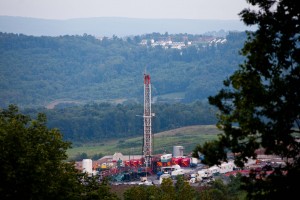Report: Pennsylvania’s effective tax rate on drillers is declining
-
Marie Cusick

The report finds the annual effective tax rate on drillers has dropped from 5.3 percent in 2011 to 2.1 percent in 2014.
Even though revenue from Pennsylvania’s gas impact fee has generally ticked upward over the years, the annual effective tax rate on Marcellus Shale drillers has steadily gone down– that’s according to a new analysis released by the state’s Independent Fiscal Office.
The IFO is modeled on the U.S. Congressional Budget Office and provides nonpartisan analysis for budgetary purposes. In a brief released Thursday, the IFO found the effective tax rate on natural gas drillers has declined steadily over the past four years– from 5.3 percent in 2011 to 2.1 percent in 2014.
“Over time the effective tax rate of the impact fee has declined,” says IFO director Matthew Knittel. “That is mainly due to the large increase in the production of natural gas.”
The IFO brief comes in the wake of new data from the state Department of Environmental Protection, which shows Marcellus Shale drillers recently broke another production record– approaching nearly 4 trillion cubic feet of gas in 2014.
Under the state’s 2012 oil and gas law, known as Act 13, gas companies have to pay a flat impact fee for each well they drill. The fees have brought in an average of $210 million per year. The IFO estimates the fees will generate about $220 million this year.
Since the fees are not directly tied to gas production levels or prices, they don’t give a measure of the tax burden relative to sales. The IFO computed drillers’ effective tax rate by dividing the impact fee revenue by the total market value of unconventional gas production.
“We’re finding the volatility of the natural gas prices to be very high,” says Knittel.
“So that effect tax rate could move up or down next year.”
At the request of state Sen. David Argall (R- Schuylkill), the IFO published a report last year comparing the state’s effective gas tax rate to 10 other major shale states and found that Pennsylvania has one of the lowest rates in the country. That report and this new brief only examine the impact fee– not the industry’s entire tax burden, which includes other taxes, like sales and corporate net income tax.
Many drillers are large multi-state or multi-national corporations, which only do a portion of their business in Pennsylvania. Knittel says that makes it difficult to determine how much of those other kinds of taxes actually go into the state coffers.
Note: this story has been updated to reflect the following clarification. Pennsylvania’s gas production totals approached– but did not surpass– 4 trillion cubic feet in 2014.
















